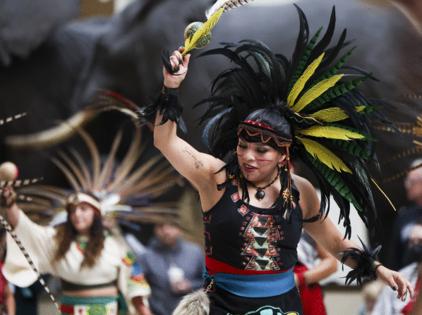Two holidays, one Chicago: Indigenous Peoples Day and Columbus Day celebrated across the city
Published in News & Features
Jasmine Eleck, an early career fellow at the Field Museum who is indigenous to California, studied history in college because she had seen certain histories suppressed.
“I want to ensure that I include more perspectives and more voices in history,” said Eleck, a 2024 graduate of Centre College in Kentucky. Eleck, 22, helped organize the Field Museum’s celebration of Indigenous Peoples Day on Monday, which included an hourlong Aztec dance demonstration in the museum’s cavernous Stanley Field Hall.
The highlight of the day for Eleck, however, was watching toddlers in the museum’s PlayLab try out some of the dance moves before the main performance.
As various Indigenous Peoples Day celebrations got underway across Chicago — including the Monday morning events at the Field Museum and activities at the Chicago Children’s Museum — more than 50 organizations prepared to march down South State Street early in the afternoon as part of the city’s 72nd Columbus Day Parade. The city recognizes the Columbus Day holiday on the second Monday in October.
Four years after then-Mayor Lori Lightfoot ordered statues of Christopher Columbus removed from Chicago’s Grant and Arrigo parks, sparking a debate over the explorer’s legacy and a lawsuit from the city’s Italian leaders, celebrations of both holidays occurred across the city in perhaps an uneasy truce.
Indeed, Ron Onesti, president of the Joint Civic Committee of Italian Americans, said Monday that a compromise solution is expected in the next couple of weeks to have the Columbus statues displayed in the city again.
At the parade, Rossana Wozniak, 53, of Schorsch Village, said she used to watch it in high school and has been participating in it with Italian American Executives of Transportation for about a decade. Wozniak said the parade was a chance for the city’s Italian community to gather.
“It’s to help celebrate our Italian culture and heritage,” she said. “And then we have our organizations — all the different organizations, so it’s just to help celebrate that.”
Peter Pavone, 67, of suburban Norridge, also marched in the parade. Pavone said he emigrated from Italy to the United States in 1966 and now owns a pizzeria.
“Respect us Italians,” Pavone said. “We’re good people. Wherever we go, grass grows green.”
For decades, Indigenous Peoples Day has had a storied history as a counter-celebration to Columbus Day as activists around the country have condemned Columbus, pointing to his mistreatment of Indigenous people after he landed in the Americas in 1492.
The city of Berkeley, California, replaced Columbus Day with Indigenous Peoples Day in 1992; Chicago Public Schools replaced it in 2020. Two years later, President Joe Biden proclaimed the holiday as Indigenous Peoples Day following his first proclamation recognizing the day in 2021.
Although Mayor Brandon Johnson has expressed support for replacing Columbus Day with Indigenous Peoples Day, it is not celebrated by the city, the state of Illinois or Cook County.
At the Field Museum, Courtney Christoff took in the demonstration by Huehuecoyotl, the Aztec dance group, with her 1-year-old son, 4-year-old daughter and her husband.
Since her daughter had the day off school on Monday, Cristoff said she and her husband decided to bring her someplace where she could learn why she was off school.
“I felt like when I was growing up, I didn’t get a lot of education (about Indigenous peoples),” said Cristoff, 37, who lives in the West Town neighborhood. “We weren’t really there yet. I’m happy that we get to call (Columbus Day) something else, and get to actually learn about the people that were here first and the impact everything has had on them.”
Ana Patiño, 39, said she’s been leading Huehuecoyotl with her husband for nearly two decades.
“We struggled for the first 15 years. It was only like eight of us, or six — sometimes only me and him,” said the East Chicago resident. “But the last couple years, after COVID, it really blew up. I feel like people were looking for something.”
Patiño said she and other members of Huehuecoyotl are native to land that is now Mexico. Patiño described the traditional Aztec dance the group does as “a prayer in motion.”
Originally from Mexico City, Patiño first got into the style of dance because her husband, who also came to the Chicago area from Mexico, missed the dance so much. At the beginning, Patiño would play the beats of the dance style on a drum while her husband danced.
Today, Huehuecoyotl holds free practices in Harrison Park in Pilsen every Thursday evening.
Patiño thought it was amazing that the Field Museum hosted events for Indigenous Peoples Day and seems to prioritize educating people on all parts of history.
“The land that we’re standing on belonged to someone else a long time ago,” Patiño said. “It was taken and there’s consequences to that that still play a role in society, and knowing that, we have the power to repair those damages that were done.”
____
©2024 Chicago Tribune. Visit at chicagotribune.com. Distributed by Tribune Content Agency, LLC.







Comments